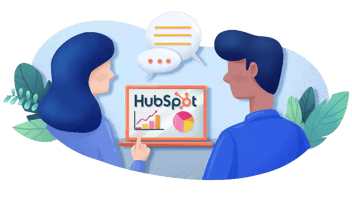Marketing conversațional: Cum convertești clienții potențiali
Marketingul conversațional încurajează interacțiunile autentice și în timp real pentru a ghida potențialii cumpărători prin pâlnia de conversie. O abordare de succes a marketingului conversațional se bazează pe înțelegerea clientului, fiind un proces iterativ care îmbunătățește continuu strategia de marketing.

Ce este marketingul conversațional?
Marketingul conversațional este o abordare de marketing care utilizează conversații bidirecționale în timp real pentru a interacționa cu clienții. Acest lucru se poate face prin chat live, chatbots sau alte platforme de mesagerie. Marketingul conversațional este conceput pentru a crea o experiență mai personalizată pentru clienți și pentru a ajuta întreprinderile să construiască relații mai puternice cu clienții. Acesta ar trebui să facă parte din orice strategie de Inbound Marketing.
Iată câteva dintre beneficiile marketingului conversațional:
-
Creșterea implicării clienților: Marketingul conversațional permite întreprinderilor să interacționeze cu clienții în timp real, ceea ce poate duce la creșterea implicării.
-
Îmbunătățirea satisfacției clienților: Clienții apreciază să aibă o conversație personalizată cu o afacere, ceea ce poate îmbunătăți satisfacția clienților.
-
Creșterea vânzărilor: Marketingul conversațional poate ajuta întreprinderile să încheie mai multe vânzări, oferindu-le clienților informațiile de care au nevoie pentru a cumpăra.
Marketingul conversațional este o opțiune excelentă dacă doriți să vă îmbunătățiți implicarea clienților și vânzările.
Iată câteva exemple de marketing conversațional:
- Un widget de chat live pe site-ul dvs. web care permite clienților să pună întrebări și să obțină ajutor de la un reprezentant.
- Un chatbot care poate răspunde la întrebări comune și poate oferi asistență clienților.
- O aplicație de mesagerie care vă permite să vă conectați cu clienții pe platforma lor preferată.
Importanța marketingului conversațional
Marketingul conversațional utilizează tehnologia pentru a facilita implicarea între întreprinderi și clienți. Această strategie poate include diverse platforme, cum ar fi site-uri web, rețele sociale, e-mail și mesaje text și utilizează din ce în ce mai mult tehnologia AI, în special chatbots. Chatbots-urile asigură o comunicare imediată și fiabilă, ceea ce este esențial în peisajul actual de consum în ritm rapid. De asemenea, acestea ajută la colectarea informațiilor și feedback-ului clienților, ceea ce este esențial pentru îmbunătățirea produselor și serviciilor.
Întreprinderile ar trebui să se implice activ cu publicul lor prin diverse canale, cum ar fi social media, și să utilizeze instrumente de analiză pentru a urmări comportamentul și interesele utilizatorilor. Chatbots pot oferi un instrument valoros pentru implicarea în timp real, iar întreprinderile ar trebui să utilizeze tehnologia pentru a fideliza clienții și pentru a obține informații utile pentru creștere.
Feedback-ul este esențial pentru îmbunătățirea produselor sau serviciilor pentru orice întreprindere. Este o idee bună să vă ascultați publicul și să aflați ce crede acesta despre brandul dvs. Puneți întrebări, efectuați sondaje și implicați-vă cu utilizatorii dumneavoastră. Singura modalitate de a îmbunătăți ceva este să înțelegeți exact ce trebuie reparat. Luați în considerare utilizarea social media pentru a declanșa conversații cu publicul dvs. Știți deja că implicarea și răspunsul continuu la feedback-ul clienților sunt cruciale, dar echipa dvs. de marketing ar trebui, de asemenea, să verifice și să monitorizeze analizele. Facebook Analytics, Instagram Insights și Twitter Analytics pot fi utilizate pentru a ține evidența intereselor și obiceiurilor de cumpărare ale utilizatorilor.
Analytics ne oferă o perspectivă vitală asupra comportamentului clienților, dar poate fi teoretică. Dacă întreprinderile doresc să interacționeze cu clienții în timp real, cum pot face acest lucru? Dacă ați spus chatbots, atunci da, începeți să gândiți ca un marketer care utilizează marketingul conversațional. Nu uitați, este esențial să folosiți tehnologia în avantajul dumneavoastră pentru a câștiga loialitatea clienților și pentru a obține un feedback vital care să vă ajute să vă dezvoltați afacerea.
Beneficiile marketingului conversațional
Avem conversații în fiecare zi, în special în afaceri. Utilizarea instrumentelor care optimizează conversațiile dintre dvs. și clienții dvs. este un lucru de la sine înțeles. Marketingul conversațional are mai multe beneficii, printre care:
-
Creșterea implicării: Prin utilizarea interacțiunilor autentice, în timp real, marketingul conversațional permite întreprinderilor să se implice cu clienții într-un mod mai personal și mai semnificativ, ceea ce duce la niveluri mai ridicate de implicare a clienților.
-
Scurtarea ciclului de vânzări: Prin ghidarea clienților prin pâlnia de conversie, marketingul conversațional poate contribui la scurtarea ciclului de vânzări și la creșterea conversiilor.
-
Îmbunătățirea înțelegerii clienților: Prin implicarea clienților în conversații, întreprinderile pot obține informații despre nevoile, preferințele și comportamentul clienților, care pot fi utilizate pentru îmbunătățirea produselor și serviciilor și pentru adaptarea eforturilor de marketing.
-
Servicii mai bune pentru clienți: Chatbots și alte tehnologii conversaționale pot oferi un serviciu clienți imediat, 24/7, contribuind la îmbunătățirea satisfacției și loialității clienților.
-
Creșterea veniturilor: Marketingul conversațional poate crește veniturile afacerii prin concentrarea pe implicarea și conversia clienților.
-
Umanizarea experienței de cumpărare: Crearea unei interacțiuni mai umane ajută la construirea încrederii și loialității între client și brand, făcând experiența de cumpărare mai plăcută.
-
Colectarea datelor: prin punerea în aplicare a unei strategii de marketing conversațional, întreprinderile pot colecta date privind implicarea clienților, feedback-ul acestora și obiceiurile de cumpărare, care pot informa viitoarele eforturi de marketing.

Marketingul conversațional urmărește să ofere valoare consumatorilor și să îi întâlnească acolo unde se află. Acest lucru înseamnă că conversațiile ar trebui să aibă loc acolo unde este cel mai probabil ca consumatorul să se angajeze în conversație. Aceasta poate include convorbiri telefonice, pe rețelele de socializare, aplicații de mesagerie, cu un om sau cu un chatbot. Depinde de dvs. ca întreprindere să vă dați seama unde se află publicul dvs. și să aveți capacitatea de a oferi confort oriunde s-ar afla acesta.
De ce ar trebui să implementați o strategie de marketing conversațional?
O companie de succes are un flux constant de clienți potențiali care intră în pâlnia sa de conversie. Scopul lor este să califice lead-urile rapid și eficient. Optimizarea pâlniei de conversie poate dura până la un an pentru a vedea rezultate semnificative. Acest lucru înseamnă că întreprinderile nu doresc să piardă timp și bani pe lead-uri care probabil nu se vor transforma în cumpărători.
Întreprinderile din trecut, și chiar unele din prezent, se bazau pe formulare de captare a lead-urilor, e-mailuri și instrumente similare pentru generarea de lead-uri. Au existat multe probleme cu care clientul s-a confruntat cu această modalitate tradițională de generare de lead-uri. Clientul avea probleme în a aștepta prea mult timp un răspuns prin e-mail, în a completa formulare lungi și anevoioase și în a programa apeluri telefonice cu un reprezentant de vânzări. Cu toate acestea, echipele de marketing și vânzări au învățat că acesta nu era un mod eficient de a conduce lead-uri. Ele au conceput modalități de a rezolva aceste probleme pentru a derula un proces de vânzări mai fluent și pentru a oferi clientului o experiență de utilizare mai bună.
Multe întreprinderi folosesc software de marketing conversațional pentru a găsi potențiali cumpărători. Prin intermediul social media, acestea pot răspunde la întrebări, pot asista clienții în alegerea produselor potrivite și îi pot împinge mai departe în pâlnia de conversie pentru a realiza vânzarea finală. Social media este unul dintre instrumentele de top pe care marketerii le folosesc atunci când vine vorba de marketing. Clienții potențiali defilează zilnic pe dispozitivele lor mobile și inteligente. Fie că fac sau nu cumpărături, este totuși o modalitate excelentă de a comercializa produse și servicii pe aceste platforme. Un chatbot poate crește șansele utilizatorului de a se angaja cu brandul dumneavoastră.
Mulți oameni cred că roboții sunt folosiți ca serviciu clienți glorificat, dar sunt mai mult decât atât. Roboții pot fi primul punct de contact între marca dvs. și clienții dvs. Roboții de chat au două rezultate; în primul rând, pot depăși așteptările clientului sau, în cele din urmă, pot îndepărta un client.
Atunci când doriți să implementați un AI Chatbot, este vital să cercetați și să alegeți chatbotul potrivit pentru compania dvs. Vedeți ce folosesc alții din industria dvs. și luați în considerare implementarea acestor instrumente pentru a oferi servicii mai bune clienților. Tehnologia IA este aici pentru a rămâne și va continua să avanseze. IA poate reinventa modul în care comunicăm cu clienții și ne poate ajuta să colectăm date valoroase pentru a îmbunătăți implicarea clienților.
This content is also available in:
- Deutsch: Wie geht's? Conversational Marketing zur Lead-Konvertierung
- English: Role of Conversational Marketing in Converting Leads
- Español: El rol del marketing conversacional en la conversión de leads
- Français: Le rôle du marketing conversationnel dans la conversion des prospects
- Italiano: Il ruolo del marketing conversazionale nella conversione dei lead
- 简体中文: 对话式营销在转化潜在客户中的作用








Lasă un comentariu